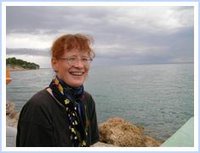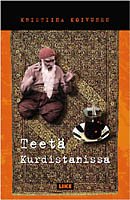Denmark is again in the front line of controversy
 Dr Kristiina Koivunen
Dr Kristiina KoivunenVihreä Lanka 24th February 2006
Kurdish TV is testing the limits of freedom of expression
Denmark is again in the front line of controversy
News about little crown prince Christian and the royal family's happiness are such news which Danish people would prefer to be sent from their country. Instead, recent news shots from Denmark have shown a confused looking prime minister, Anders Fogh Rasmussen. He has regretted the excitement caused by the caricatures of Prophet Mohammad, but said that freedom of expression is one of the western basic rights and it cannot be limited. Little Denmark has became the outpost of freedom of expression.
 At the end of last year, Denmark was also the target of very heavy pressure. At that time it came from Turkey. Although the government of Turkey is promising that it will increase the freedom of expression and the opportunities of mass communication in the Kurdish language, it is doing everything it can to force Denmark to close satellite channel Roj-TV, which sends television programmes for the Kurds from Denmark.
At the end of last year, Denmark was also the target of very heavy pressure. At that time it came from Turkey. Although the government of Turkey is promising that it will increase the freedom of expression and the opportunities of mass communication in the Kurdish language, it is doing everything it can to force Denmark to close satellite channel Roj-TV, which sends television programmes for the Kurds from Denmark.The demand for closing Roj-TV was the most important issue during the visit of prime minister, Recep Tayyip Erdogan to Denmark last November. Erdogan behaved like a five year old child and refused to come to his own press meeting, as journalist, Günem Seneser, from Roj-TV was attending it.
Turkey demands the closing of Roj-TV, it claims that the TV channel has contacts with the Kurdistan Labour Party, PKK. Without any special reason at just that moment, PKK was put on the EU list of terrorist organisations in spring 2004, later than other organisations in the list.
The programmes of Roj-TV can be followed on the internet (www.roj.tv). Have a look at the programmes of a so-called "terrorist television"! How are they? A little boring perhaps, compared for example to programmes of al-Jazeera. There are long discussions in the studio, joined by viewers via telephone. Sometimes a singer, dressed in national costume, strikes up a song in the Kurdish language.
Roj-TV also airs a lot of news, often with open criticism towards the Turkish government and military. And this can be dangerous. Despite the fact that Turkish laws have been renewed according to the demands of the European Union, law 301 of the new penal code states that it is a criminal offense to insult Turkish identity. According to the public prosecutor, for example, author Orhan Pamuk insulted Turkish identity when he claimed, in an interview, that one million Armenians died in a genocide at the beginning of the 1900s. Finally Pamuk's court case was cancelled, as the massive international attention to it was very annoying to Turkey. But court cases of 160 other writers, journalists and activists still continue based on the new penal code.
In Turkey there has been campaigns in support of Roj-TV. At the end of December, 56 Kurdish mayors sent a letter to prime minister Rasmussen demanding Roj-TV be able to continue working in Denmark. The public prosecutor started immediately criminal investigations due to this letter. If it leads to the court, hopefully the EU will support the mayors as strongly as it supported Orhan Pamuk.
Roj-TV has stayed stubbornly on the air. The company follows the laws of EU as it is aware that the programmes are viewed permanently by the authorities. It would be strange if Denmark would close the Kurdish television after it has defended the right to publish caricatures which defame Islam. If jeering other religions is acceptable, according to the ideas of western freedom of expression, then television programmes sending news, folk dances and mother language education cannot be forms of terrorism.
Dr Kristiina Koivunen works as a freelance journalist. She completed her PhD thesis in Helsinki University 2002. Her doctoral dissertation "The Invisible War in North Kurdistan" is in internet: http://ethesis.helsinki.fi/julkaisut/val/sospo/vk/koivunen
Vihreä Lanka is the weekly newspaper of the Green League of Finland.
Kristiina Koivunen's book "Teetä Kurdistanissa" (Tea in Kurdistan) was published 2001 by a Finnish publishing company LIKE. This spring LIKE will publish her next book "Southeast Turkey for adventure travellers". These books are in Finnish language.


<< Home